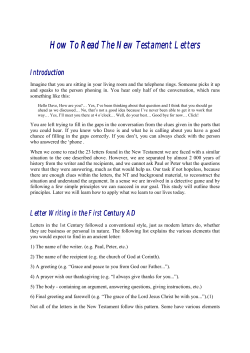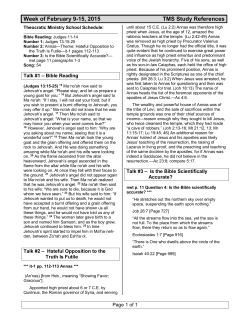
HOW TO SUCCEED AT SCHOOL
!"#2 OCTOBER 2012 HOW TO SUCCEED AT SCHOOL How to Succeed at School Which word would you use to describe how you view school? Boring or inspiring? Frustrating or rewarding? Stressful or enjoyable? If your view of school is primarily negative, what can you do about it? If you have a positive view of school, how can you sharpen your skills so that you get even more out of your education? Using the Bible as a guide, on pages 3 through 7, we will outline five keys to success. Many of the principles discussed in this series apply whether you attend public school or private school or are homeschooled. !"#2 AVERAGE PRINTING 41,042,000 PUBLISHED IN 84 LANGUAGES How to Succeed at School 3 Get Motivated 4 Get Organized 5 Get Help 6 Stay Healthy 7 Have a Goal 8 What Parents Can Do 10 Winning the War Against Obesity in the Young 22 The Bible’s Viewpoint Do the Stars Affect Your Life? 12 Face-to-Face With Lowland Gorillas 24 Fulfilling Your Role as a Parent 15 Was It Designed? The Sensors of the Black Fire Beetle 26 The Bible—A Book of Accurate Prophecy —Part 6 16 Young People Ask What Can I Expect From Marriage? —Part 2 29 Watching the World 19 Disturbing News Reports and Your Children 30 For Family Review 32 To Help You Succeed at School Get Motivated To be motivated in any endeavor, you need to see its practical value. ˝˝˝˝˝˝˝˝˝˝˝˝˝˝˝˝˝˝˝˝˝˝˝˝˝˝˝˝˝˝˝˝˝˝˝˝˝˝˝˝˝˝˝˝˝˝˝˝˝˝˝˝˝˝˝˝˝˝˝˝˝˝˝˝˝˝˝˝˝˝˝˝˝˝˝˝˝˝˝˝˝˝ HAT is the practical value of school? It will help you acquire wisdom, and the Bible says that “wisdom is for a protection.” (Ecclesiastes 7:12) How so? To illustrate: Imagine that you are walking through a dangerous neighborhood. Which would you prefer—to be wandering alone or to be with a group of friends who could protect you if necessary? With a good education, you have several strong “friends” always at your side. These include: Thinking ability. Going to school can help you develop what the Bible calls “common sense and sound judgment.” (Proverbs 3:21, Contemporary English Version) Acquiring these skills will help you to solve your own problems instead of always having to rely on others to bail you out. Social skills. The Bible admonishes Christians to cultivate such qualities as long-suffering and selfcontrol. (Galatians 5:22, 23) Mixing with a variety of people at school gives you plenty of opportunity to master those qualities, along with tolerance, respect, and empathy—traits that will serve you well in adulthood. Practical training. School can teach you the value of having a strong work ethic, which will help you to get a job and keep it. Also, the more you learn about the world around you, the better equipped you will be to know who you are and what you believe. (Proverbs 14: 15) Armed with such conviction, you will be able to stand up for your beliefs respectfully.—1 Peter 3:15. The bottom line: Since you need an education, it will do you little good to dwell on the things you dislike about school. Instead, get motivated by considering the incentives noted above. You may even be able to think of a few more! Why not get started? Think of your greatest incentive for succeeding at school. W Practical training Social skills Thinking ability Good teachers are appreciated! “My high-school economics teacher could have been working at a financial institution, but instead he chose to teach at our inner-city high school—a place where most kids didn’t care about economics. Still, he taught the subject simply, with humor, and in a way that related to us. One time he even called my mom to tell her how well I did on an essay. When students asked him why he taught at our school, he said it was the best place he had ever worked. He understood us, he was concerned about us, and he commended us. He was the best teacher I ever had!”—Reyon, United States. Awake! October 2012 3 Get Organized The small effort it takes to get organized can lead to a huge payoff —more time, less stress, and better grades. ˝˝˝˝˝˝˝˝˝˝˝˝˝˝˝˝˝˝˝˝˝˝˝˝˝˝˝˝˝˝˝˝˝˝˝˝˝˝˝˝˝˝˝˝˝˝˝˝˝˝˝˝˝˝˝˝˝˝˝˝˝˝˝˝˝˝˝˝˝˝ MAGINE that you walk into a store to buy a single item, but all the merchandise is randomly scattered about with no sense of order. How long will it take you to find what you are looking for? Would you not find it easier if the items were neatly arranged and the aisles were clearly labeled? You can take a similar approach to your schooling. How? Establish a schedule. “One time I completely forgot about my homework—and neglected my chores—because I was at a friend’s house for the entire weekend,” says 18-yearold Zachary, from the United States. “On Monday, I had to beg my teachers to let me turn in my work late. Now I make to-do lists, which help me to remember what I need to get done.” Writing things down also helped Celestine, a young woman in Papua New Guinea. Reflecting on her school days, she says: “I kept a schedule of all my activities, including homework, exams, and social events. Doing this helped me to set priorities and meet my deadlines.” Tip: Write your to-do list in a small notebook, or store it on your cell phone or other electronic device. I !"#$ 4 Do not procrastinate. It is easy to say, “I’ll do it later.” It is better to do things as soon as possible—especially your homework. Tip: Make it a point to do your homework as soon as you get home, before turning on the TV or engaging in any other recreation. Organize your gear. Have you ever arrived at class only to discover that you forgot your notepad, pen, or books? You can avoid the hassle! How? “I always packed my schoolbag in advance,” says Aung Myo Myat, a young man in Myanmar. Tip: Keep your schoolbag or backpack neat and orderly so that you can find things more easily. The bottom line: Getting organized will save you the stress of forgetting things, running late, and never seeming to have enough time for other priorities. Why not get started? Think about one area in which you need to get organized. Then, with a parent or a friend, brainstorm some ways that you can improve. THIS JOURNAL IS PUBLISHED for the enlightenment of the entire family. It shows how to cope with today’s problems. It reports the news, tells about people in many lands, examines religion and science. But it does more. It probes beneath the surface and points to the real meaning behind current events, yet it always stays politically neutral and does not exalt one race above another. Most important, this magazine builds confidence in the Creator’s promise of a peaceful and secure new world that is about to replace the present wicked, lawless system of things. This publication is not for sale. It is provided as part of a worldwide Bible educational work supported by voluntary donations. Unless otherwise indicated, Scripture quotations are from the modern-language New World Translation of the Holy Scriptures—With References. Awake! (ISSN 0005-237X) is published monthly by Watchtower Bible and Tract Society of New York, Inc.; L. Weaver, Jr., President; G. F. Simonis, SecretaryTreasurer; 25 Columbia Heights, Brooklyn, NY 11201-2483, and by Watch Tower Bible and Tract Society of Canada, PO Box 4100, Georgetown, ON L7G 4Y4. Periodicals Postage Paid at Brooklyn, N.Y., and at additional mailing offices. POSTMASTER: Send address changes to Awake!, 1000 Red Mills Road, Wallkill, NY 12589-3299. 5 2012 Watch Tower Bible and Tract Society of Pennsylvania. All rights reserved. Printed in Canada. Vol. 93, No. 10 Monthly ENGLISH Get Help Having a support system is not only vital while you are at school but also indispensable in your future endeavors as an adult. ˝˝˝˝˝˝˝˝˝˝˝˝˝˝˝˝˝˝˝˝˝˝˝˝˝˝˝˝˝˝˝˝˝˝˝˝˝˝˝˝˝˝˝˝˝˝˝˝˝˝˝˝˝˝˝˝˝˝˝˝˝˝˝˝˝˝˝˝˝˝ HO can help you in your efforts to succeed at school? Family. “When I needed help with my homework,” says Bruna, an 18-year-old girl in Brazil, “my dad would explain the material and ask leading questions. But he let me find the answers myself.”1 Tip: To get started, ask your parent how well he or she did with the subject that you find challenging. If that parent did well, he or she may be just the person to help you. Teachers. Most teachers are happy to know that a student genuinely wants to succeed, and they would be glad to give assistance. Tip: Simply tell your teacher, “I’m struggling with this class, but I want to succeed. What would you recommend?” Mentors. Perhaps a trusted family friend can help you. Such an arrangement can have a twofold benefit: First, you will get the assistance you need; and second, you will learn to rely on support when necessary—a practice that will benefit you in adulthood. The fact is, success in most endeavors is a team effort, not a solo performance.—Proverbs 15:22. W Tip: Ask your parents about who might be a good mentor for you. The bottom line: There is nothing wrong with asking for help! Why not get started? Make a list of two or three role models—people whom you look up to. Would any of those individuals be in a position to help you with your schoolwork? “My favorite teacher” “My favorite teacher was really strict, but everyone respected him. He was enthusiastic. He gestured and walked from one side of the room to the other as he spoke. He got everyone involved in class discussions. If you didn’t understand a point, he patiently explained it until you did understand. He repeatedly told us that he welcomed our questions. He said that questions would not only help him see what we didn’t understand but also help him become a better teacher. He took a personal interest in everyone. Many students chose to pursue a career in accounting—the field he taught—after spending just one year in his class!”—Alana, Australia. 1 An older sibling might be able to help you as well. LANGUAGES: Afrikaans, Albanian, Amharic, Arabic, Armenian, Bislama, Bulgarian, Cebuano, Chichewa, Chinese (Simplified), Chinese (Traditional)7 (audio Mandarin only), Chitonga, Cibemba, Croatian, Czech,7 Danish,7 Dutch,67 English,67 Estonian, Ewe, Fijian, Finnish,7 French,687 Georgian, German,67 Greek, Gujarati, Hebrew, Hiligaynon, Hindi, Hungarian, Icelandic, Igbo, Iloko, Indonesian, Italian,67 Japanese,67 Kannada, Kinyarwanda, Kirghiz, Kirundi, Korean,67 Latvian, Lingala, Lithuanian, Macedonian, Malagasy, Malayalam, Maltese, Myanmar, Norwegian,7 Polish,67 Portuguese,687 Punjabi, Rarotongan, Romanian, Russian,67 Samoan, Sepedi, Serbian, Sesotho, Shona, Silozi, Sinhala, Slovak, Slovenian, Spanish,67 Swahili, Swedish,7 Tagalog,7 Tamil, Thai, Tok Pisin, Tongan, Tsonga, Tswana, Turkish, Twi, Ukrainian, Urdu, Vietnamese, Xhosa, Yoruba, Zulu 6 CD also available. 8 MP3 CD-ROM also available. 7 Audio recordings also available at www.jw.org. WOULD YOU WELCOME MORE INFORMATION OR A FREE HOME BIBLE STUDY? Please send your request to Jehovah’s Witnesses, using one of the addresses below. For a complete list of addresses, see www.jw.org/contact. America, United States of: 25 Columbia Heights, Brooklyn, NY 11201-2483. Australia: PO Box 280, Ingleburn, NSW 1890. Britain: The Ridgeway, London NW7 1RN. Canada: PO Box 4100, Georgetown, ON L7G 4Y4. Germany: 65617 Selters. Guam: 143 Jehovah St, Barrigada, GU 96913. Jamaica: PO Box 103, Old Harbour, St. Catherine. Japan: 4-7-1 Nakashinden, Ebina City, Kanagawa-Pref, 243-0496. Puerto Rico: PO Box 3980, Guaynabo, PR 00970. South Africa: Private Bag X2067, Krugersdorp, 1740. Trinidad and Tobago: Lower Rapsey Street & Laxmi Lane, Curepe. Awake! October 2012 5 Stay Healthy Taking care of your health can improve your performance at school —and your quality of life. ˝˝˝˝˝˝˝˝˝˝˝˝˝˝˝˝˝˝˝˝˝˝˝˝˝˝˝˝˝˝˝˝˝˝˝˝˝˝˝˝˝˝˝˝˝˝˝˝˝˝˝˝˝˝˝˝˝˝˝˝˝˝˝˝˝˝˝˝˝˝ T ONLY makes sense to take care of the body that God gave you. (Psalm 139:14) To illustrate: Imagine that you own a car, but you never take time to maintain it. The car will only go so far before it breaks down. The same can happen to your body. What kind of “maintenance” do you need? Rest. Skimping on sleep can make you look haggard and leave you feeling lethargic, confused, and even depressed. In contrast, getting sufficient rest will give you more energy. It can also accelerate your physical growth, improve your brain function, boost your immune system, and enhance your emotional well-being. That is quite a return for something that requires so little effort! Tip: If possible, try to go to bed at the same time each night. Nutrition. Teens grow rapidly. Between the ages of 10 and 17, for example, most boys double their lean body weight. Girls experience a growth spurt too. Growing bodies need plenty of raw materials and energy. Make sure that you give your body the nutrition it needs. Tip: Do not skip breakfast. ‘Fueling up’ before class can help you improve your concentration and your short-term memory. Exercise. The Bible acknowledges that “exercise is good for your body.” (1 Timothy 4:8, Contemporary English Version) It can strengthen your muscles and bones, improve your stamina, control your weight, increase your mental capabilities, boost your immunity, alleviate stress, and lift your mood. Of I 6 Awake! October 2012 course, exercise can also be fun, since it can include activities you enjoy! The bottom line: Adequate sleep, balanced nutrition, and moderate exercise will help you keep your “engine” running. And that, in turn, will help you upgrade your performance in the classroom.1 Why not get started? Establish a reasonable exercise routine. Track your sleeping habits and diet for a month, and note any improvements you need to make. “When I go for a walk, I seem to get more energy—even if I was tired when I started out.”—Jason, New Zealand. “My thinking is, God made food to fuel our bodies, and I want to put the best fuel in me!” —Jill, United States. “I run three times a week, and I bike or walk twice a week. Exercise gives me more energy and releases stress.”—Grace, Australia. 1 For more information on your health, see chapter 10 of the book Questions Young People Ask—Answers That Work, Volume 1, published by Jehovah’s Witnesses. Have a Goal School becomes more meaningful —and more enjoyable—when you know where your education is taking you. ˝˝˝˝˝˝˝˝˝˝˝˝˝˝˝˝˝˝˝˝˝˝˝˝˝˝˝˝˝˝˝˝˝˝˝˝˝˝˝˝˝˝˝˝˝˝˝˝˝˝˝˝˝˝˝˝˝˝˝˝˝˝˝˝˝˝˝˝˝˝ OING through school without a goal is like running a race on a track that has G no finish line. The Bible says: “Know where you are headed.” (Proverbs 4:26, Contemporary English Version) Having a goal will keep you focused and make your transition to the working world smoother. How can you set a goal? Ask yourself, ‘How do I plan to earn a living?’ Do not put off answering that question. Instead, plan early. Why? Think of it this way: If you wanted to go on a trip, first you would need to decide on your destination. Then you would look at a map and determine the best way to get there. You can take a similar approach to your schooling. Think about which occupation you will pursue, and then choose courses that will help you reach your destination. Caution: Many young people are so determined to do only work that they feel most passionate about—becoming a professional musician, for example—that they find the thought of any other type of employment intolerable. What is a better approach? 1. Consider your abilities. For example, do you enjoy service-related tasks or being helpful to others? Are you good at mechanics? numbers? finances? fixing things? 2. Consider your options. Which occupations are a good match for your abilities? Brainstorm several options rather than focusing only on your “dream” job. And think practically. For example, will the field you want to pursue be available in other locations, in case you should move? Will the training that is required put you in unreasonable debt? 3. Consider your opportunities. Once you know which occupation you would like to pursue, look at the market for that type of work locally. Do you know any potential employers? If so, do they offer apprenticeships? Are there vocational training programs available? Tip: Consult your parents, teachers, and adult friends. Check out your local library and online resources. The bottom line: If you have a goal, your education will have direction and purpose. Why not get started? Think now, while you are still in school, about the three points noted above. Write down your goals, and discuss them with your parents. You might have noticed that this series frequently referred to the Bible when outlining the keys to success at school. The publishers of this magazine, Jehovah’s Witnesses, believe that the Bible contains “instruction for right living.” (2 Timothy 3: 16, Good News Translation) It is practical for everyday life—not only at school but also at work, in the family, and elsewhere. For more information on how the Bible can help you, visit the Web site www.jw.org and see page 32 of this magazine. What Parents Can Do “Our school had few teachers, so students didn’t get personal attention. The school had no maps, no lab equipment, no library.” —Dorcus, Myanmar. S THE statements above show, some schools are anything but a haven for learning. As a parent, how can you help your children get the most from their education despite the challenges? Here are some suggestions. Show initiative. Instead of focusing on the problems—many of which are likely out of your control—focus on what you can do. If your child seems unable to master a certain subject or is overwhelmed by the amount of homework he or she receives, try to brainstorm a few solutions together. For example, do you need to create a better study area at home? Does your child need help with setting up a schedule to get the most important tasks accomplished? Would he or she benefit by having the assistance of a tutor? For further suggestions, perhaps you could speak with your child’s teacher and guidance counselor. View these people as your allies, not your adversaries. A ˝˝˝˝˝˝˝˝˝˝˝˝˝˝˝˝˝˝˝˝˝˝˝˝˝˝˝˝˝˝˝˝˝˝˝˝˝˝ ˝˝˝˝˝˝˝˝˝˝˝˝˝˝˝˝˝˝˝˝˝˝˝˝˝˝˝˝˝˝˝˝˝˝˝˝˝˝ “Too many students were crammed into a classroom! There were no fans, and the heat was suffocating.” —Luis, Bolivia. “Most of my teachers struggled to control the class. At times, students were very unruly, which made studying that much more difficult.”—Nina, South Africa. The goal should not be merely to learn how to acquire wealth. Yet, research shows that many young people pursue education with that very goal in mind—to get rich. The Bible promotes a balanced view of material things. ˝˝˝˝˝˝˝˝˝˝˝˝˝˝˝˝˝˝˝˝˝˝˝˝˝˝˝˝˝˝˝˝˝˝˝˝˝˝˝˝˝˝˝˝˝˝˝˝˝˝˝˝˝˝˝˝˝˝˝˝˝˝˝˝˝˝˝˝˝˝ Education should equip your child to grow into a well-rounded, responsible adult While it acknowledges that “money is for a protection,” it also warns that “those who are determined to be rich” will not find real happiness.—Ecclesiastes 7:12; 1 Timothy 6:9. Let your child learn through adversity. Many schoolteachers say that as difficult as their students can be to deal with, parents can be even worse. Some parents are quick to intervene and protest when their son or daughter gets in trouble or performs poorly on a test. Keep your child focused on the goal of edu- For example, a Time magazine report tells of cation. Education should equip your child to one college professor who has had students grow into a well-rounded, responsible adult. who “call their parents from the classroom on 8 Awake! October 2012 View your child’s teacher as your ally, not your adversary a cell phone to complain about a low grade and then pass the phone over to her, in the middle of class, because the parent wanted to intervene. And she has had parents say they are paying a lot of money for their child’s education and imply that anything but an A is an unacceptable return on their investment.” much interference in problem solving for their children while the children sit back and do nothing, the parents will get stronger, but the children get weaker and fall over when they try to run on their own.” ˝˝˝˝˝˝˝˝˝˝˝˝˝˝˝˝˝˝˝˝˝˝˝˝˝˝˝˝˝˝˝˝˝˝˝˝˝˝˝˝˝˝˝˝˝˝˝˝˝˝˝˝˝˝˝˝˝˝˝˝˝˝˝˝˝˝˝˝˝˝ tion can help prepare your child for responsible adulthood. (Genesis 2:24) But how much schooling does reaching that goal require? Do not assume that your child must attend a university to make a decent living. There are other options that are less costly. In fact, in some cases those with trade skills can make as good a living as university graduates. The bottom line: Schools are not perfect, and children face challenges today that were unheard of just a few decades ago. But with your support, your child can succeed at school! As a family, why not discuss the suggestions found on pages 3 through 7 of this magazine? Many schoolteachers say that as difficult as their students can be to deal with, parents can be even worse Such parents are doing their children no favors. In fact, instead of “rescuing” their children, they are preventing them from “having real experiences of decision making, failing, and cleaning up their own messes,” writes Polly Young-Eisendrath in her book The SelfEsteem Trap. She adds: “If parents run too Be reasonable with regard to how much education to pursue. As mentioned earlier, educa- Awake! October 2012 9
© Copyright 2025





















